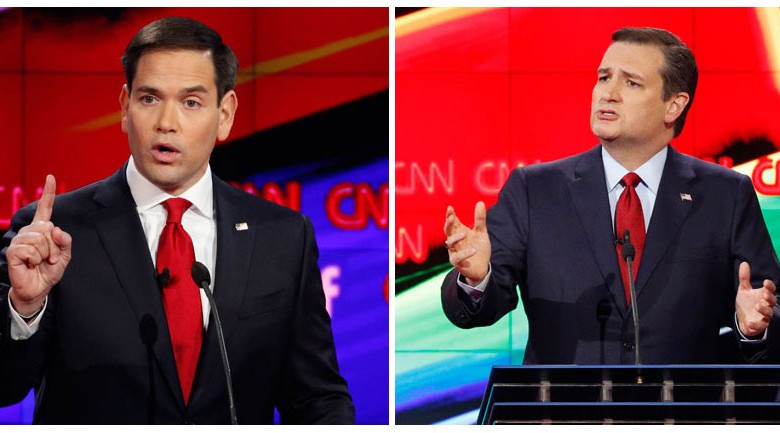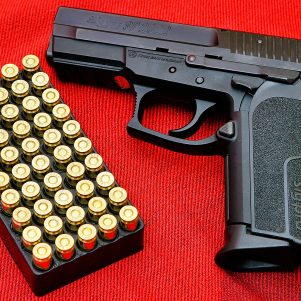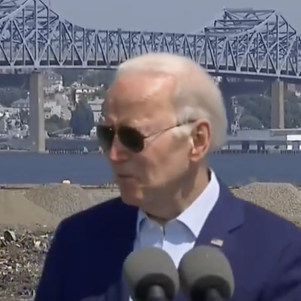Debate exposes Rubio-Cruz divide, elevates Christie profile
By Evan Lips | December 16, 2015, 19:20 EST
 Marco Rubio and Ted Cruz during a Republican debate. (AP photos)
Marco Rubio and Ted Cruz during a Republican debate. (AP photos) LAS VEGAS – The fifth Republican presidential debate of the 2016 election cycle, which on Tuesday drew roughly 18 million viewers to cable news giant CNN, promised to be a showdown on national security and remained true to its billing.
The night’s most memorable moment, however, came as two senators, Ted Cruz of Texas and Florida’s Marco Rubio, squared off over a bill that limited some government surveillance methods that had been used under the 2001 USA Patriot Act.
The ideological divide between Cruz and Rubio burst into the open as they traded barbs over the June passage of the USA Freedom Act, a bill backed by President Barack Obama, which eroded some data collection powers that had been granted by the Patriot law. Rubio ripped Cruz for supporting the Freedom Act, citing recent terrorist activity, and argued that America is “now at a time when we need more tools, not less,” to combat terrorism, and added that the lost surveillance technique “was a valuable tool that we no longer have at our disposal.”
The back-and-forth between Cruz and Rubio nearly overshadowed New Jersey Gov. Chris Christie’s performance, which the New York Post’s John Podhoretz opined has made the race “a lot more interesting.”
Some of the loudest cheers from the Las Vegas theater audience came when Christie doubled-down on the definition of a “no-fly zone,” should one be established over parts of Syria. Prodded by CNN moderator Wolf Blitzer, Christie said he’d order American forces to shoot down unauthorized Russian jets in the event the U.S. had established a no-fly zone over Syria.
“Maybe because I’m from New Jersey, I just have this kind of plain-language hangup,” the former federal prosecutor said.
Yet the one issue Christie appears to have the hardest time getting past involves Hurricane Sandy and a grateful hug. Opponents of the New Jersey governor, along with the media, haven’t hesitated to invoke the image of Christie embracing re-election candidate Obama amid the ruins of the Jersey shore left by Sandy at the end of October in 2012.
“And yes, we would shoot down the planes of Russian pilots if in fact they were stupid enough to think that this president was the same feckless weakling as the president we have in the Oval Office right now,” Christie said, adding to his rigid stance on no-fly zones.
Christie’s attack on Obama provoked more than a few members of the media to recall the numerous photo-ops from the fall of 2012:
Chris Christie with the “feckless weakling” a few days before Election Day 2012. pic.twitter.com/DdQazK3dr5
— Matt Viser (@mviser) Dec. 16, 2015
Where Christie may have won voters over, especially in New Hampshire, was during his closing remarks. During a debate that focused on terrorism and threats to America’s security, Christie reminded the audience of his close proximity to the 9/11 attacks, and recalled how his wife and brother happened to be working just blocks away from New York’s World Trade Center at the time of the deadliest attack on American soil since Pearl Harbor.
Christie also pointed out that as a federal prosecutor, he played a key role in the aftermath of the attacks.
“Terrorism – radical jihadist terrorism – is not theoretical to me. It’s real. And for seven years, I spent my life protecting our country against another one of those attacks,” Christie said. “You won’t have to worry when I’m president of the United States whether that can be done because I’ve already done it. I want the chance to do it again to protect you, your children and your families.”
And then there was New York billionaire Donald Trump, standing on stage at the Venetian Theater, less than a mile from his 64-story Trump International Hotel. On Wednesday, like candidates are prone to do, Trump told anyone who would listen that he won the debate, citing instant online polls:
Clear winner of the #GOPDebate. Thank you for your support! #MakeAmericaGreatAgain #Trump2016 pic.twitter.com/dl6IuSHwtK
— Donald J. Trump (@realDonaldTrump) Dec. 16, 2015
Yet the reliability of immediate online polling, especially following a presidential debate, has been spotty. Consider Bernie Sanders, the Vermont senator in the hunt for the Democratic presidential nomination. Online polls posted immediately after the second Democratic debate
showed him dominating rival Hillary Clinton, the former U.S. secretary of state. Once the dust settled, however, it was Clinton who emerged the victor, based on old-fashioned telephone surveys.
Other forms of grading, like a focus group run by political analyst Frank Luntz, have proven to be solid bellwethers. During the CNBC-hosted Republican debate in October, Luntz’s instant-response focus group of Iowans registered the highest marks he said he had ever seen when Cruz ripped into the media and television networks over the tone of the questions their representatives were asking.
Since then, Cruz has surged to the top in Iowa, overtaking Trump, Rubio and retired neurosurgeon Ben Carson, according to a RealClearPolitics.com average of recent polls.
On Wednesday, Luntz said on Twitter.com that Cruz and Christie won the highest marks from his focus group.
My focus group picked @TedCruz and @ChrisChristie as winners of last night’s #GOPDebate. https://t.co/Ccav9zS0vw — Frank Luntz (@FrankLuntz) Dec. 16, 2015
Three things are also worth noting about the three-hour debate:
According to a timer maintained by National Public Radio, Cruz got the most airtime, checking in at almost 16 minutes, or 15 minutes and 58 seconds. Here’s the breakdown for the rest, in minutes and seconds: Rubio, 13:33; Trump, 13:25; Christie, 10:45; Carson, 10:27; former Florida Gov. Jeb Bush, 10:13; Paul, 9:46; former Hewlett-Packard chief Carly Fiorina, 9:32, and Ohio Gov. John Kasich trailed the field at exactly nine minutes.
Bush’s debate-watching party in Florida was as cheery as his campaign has been:
Source sends pic of scene at Jeb Miami debate-watching party: pic.twitter.com/RsZJpEVSuq
— Matea Gold (@mateagold) Dec. 16, 2015
Did Cruz set himself up? U.S. Sen. Richard Burr, a North Carolina Republican, instructed his staff to study debate transcripts to determine if Cruz revealed classified information on air, as Rubio suggested during the debate. The Hill, a news organization that covers all things related to Congress, spotted a Twitter comment from a Burr spokeswoman about Cruz:
Cruz shouldn’t have said that.
— Becca Glover Watkins (@beccaglover) Dec. 16, 2015
The comment in question came during an exchange between Cruz and Rubio over the National Security Agency’s surveillance program, which collects information about telephone calls. Cruz said that under the Freedom Act, it now covers 100 percent of all phone numbers compared with “20 or 30 percent of phone numbers” in the past under the Patriot law. But Burr told reporters later Wednesday the staff wasn’t investigating Cruz’s comments, and Cruz said his remarks merely reflected widely available information, the Associated Press reported late Wednesday.
Contact Evan Lips at [email protected] or on Twitter at @evanmlips.











